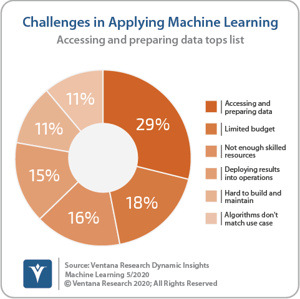Rapidminer is a visual enterprise data science platform that includes data extraction, data mining, deep learning, artificial intelligence and machine learning (AI/ML) and predictive analytics. It can support AI/ML processes with data preparation, model validation, results visualization and model optimization. Rapidminer Studio is its visual workflow designer for the creation of predictive models. It offers more than 1,500 algorithms and functions in their library, along with templates, for common use cases including customer churn, predictive maintenance and fraud detection. It has a drag and drop visual interface and can connect to databases, enterprise data warehouses, data lakes, cloud storage, business applications and social media. The platform also supports push-down processing for data prep and ETL inside databases to minimize data movement and optimize performance.
%20(1).png?width=300&name=VR_2021_AI%26ML_Assertion_1_Square%20(1)%20(1).png) Data science is becoming more and more critical to business operations. Insights gathered from an organization’s data can help various departments improve processes, drive revenue, mitigate risks and reduce costs. However, organizations are facing challenges in deriving value from their AI/ML efforts because of the skill gap between data science teams, subject matter experts and business personnel. We assert that through 2022, AI/ML solutions will remain largely independent of business intelligence solutions, requiring three-quarters of organizations to maintain multiple, separate skill sets.
Data science is becoming more and more critical to business operations. Insights gathered from an organization’s data can help various departments improve processes, drive revenue, mitigate risks and reduce costs. However, organizations are facing challenges in deriving value from their AI/ML efforts because of the skill gap between data science teams, subject matter experts and business personnel. We assert that through 2022, AI/ML solutions will remain largely independent of business intelligence solutions, requiring three-quarters of organizations to maintain multiple, separate skill sets.
Rapidminer recently showcased an integration with Tableau through the Tableau Analytics Extension and the Tableau Server Web API. This integration allows individuals to prepare data sets, explore and train models using RapidMiner, create new predictions in Tableau, and enrich existing Tableau dashboards with predictive models built in RapidMiner. This integration aims to increase collaboration across multiple disciplines on the same project. Data engineers, data scientists, data analysts and business experts can collaboratively work in the same environment on the modeling, and then also on the output and the outcome that is displayed through the Tableau BI platform.
 Organizations are recognizing the benefits of using the capabilities of data science and ML platforms to drive transformation across all verticals. Our Machine Learning Dynamic Insights research identifies the top challenges organizations face in applying ML. Accessing and preparing data, limited budget and lack of skilled resources top the list. Organizations seeking to deploy AI/ML models recognize the need for specialized skills but struggle because they do not have enough skilled data science resources to turn models into operations. Almost one-half (45%) of organizations report they have limited or no knowledge in applying ML.
Organizations are recognizing the benefits of using the capabilities of data science and ML platforms to drive transformation across all verticals. Our Machine Learning Dynamic Insights research identifies the top challenges organizations face in applying ML. Accessing and preparing data, limited budget and lack of skilled resources top the list. Organizations seeking to deploy AI/ML models recognize the need for specialized skills but struggle because they do not have enough skilled data science resources to turn models into operations. Almost one-half (45%) of organizations report they have limited or no knowledge in applying ML.
Rapidminer offers an integrated platform for the data science lifecycle through a combination of automated data science, drag and drop visual workflows, and code-based approaches. These various methods can help individuals with different skills contribute to the data science process. I recommend that organizations looking to support data science platform operations, from building data pipelines to deploying AI/ML models, evaluate Rapidminer.
Regards,
David Menninger

%20(1).png?width=300&name=VR_2021_AI%26ML_Assertion_1_Square%20(1)%20(1).png) Data science is becoming more and more critical to business operations. Insights gathered from an organization’s data can help various departments improve processes, drive revenue, mitigate risks and reduce costs. However, organizations are facing challenges in deriving value from their AI/ML efforts because of the skill gap between data science teams, subject matter experts and business personnel. We assert that through 2022, AI/ML solutions will remain largely independent of business intelligence solutions, requiring three-quarters of organizations to maintain multiple, separate skill sets.
Data science is becoming more and more critical to business operations. Insights gathered from an organization’s data can help various departments improve processes, drive revenue, mitigate risks and reduce costs. However, organizations are facing challenges in deriving value from their AI/ML efforts because of the skill gap between data science teams, subject matter experts and business personnel. We assert that through 2022, AI/ML solutions will remain largely independent of business intelligence solutions, requiring three-quarters of organizations to maintain multiple, separate skill sets. Organizations are recognizing the benefits of using the capabilities of data science and ML platforms to drive transformation across all verticals. Our
Organizations are recognizing the benefits of using the capabilities of data science and ML platforms to drive transformation across all verticals. Our 








